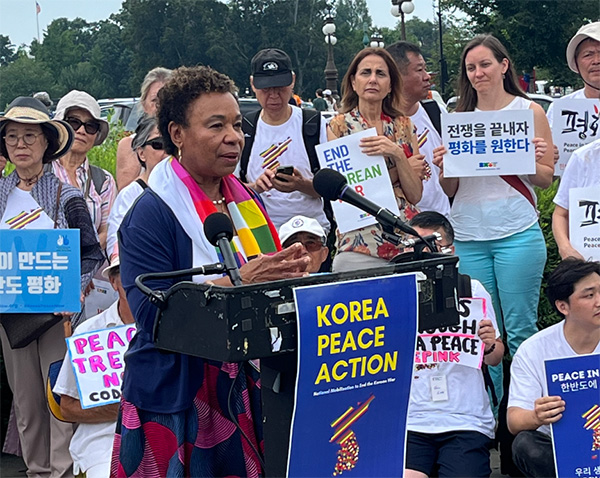
Three days after the September 11 terrorist attacks, Barbara Lee (D-CA) was the sole member of the U.S. Congress with the foresight to vote against an authorization of the use of military force that gave legal justification for the war in Afghanistan and the Global War on Terror.
Nearly 22 years later, Lee has again stood for peace by introducing the Peace on the Korean Peninsula Act with Brad Sherman (D-CA) calling for diplomacy in pursuit of a formal end to the Korean War.
Lee was the lead speaker at a press conference on Capitol Hill sponsored by the Korea Peace Action Committee on July 27 to mark the 70th anniversary of the armistice that ended hostilities in the Korean War temporarily (the armistice did not mark a formal end of the Korean War which has yet to be achieved).
The press conference marked the beginning of a larger peace mobilization and conference supported by numerous activist groups that was designed to lobby for a change in U.S. policy.

On June 26, in a deliberately provocative maneuver toward North Korea, the U.S. military deployed a U.S. nuclear submarine carrying 20 Trident missiles to the Port of Busan; the first deployment of a nuclear-armed submarine in South Korea by the U.S. since the early 1980s.
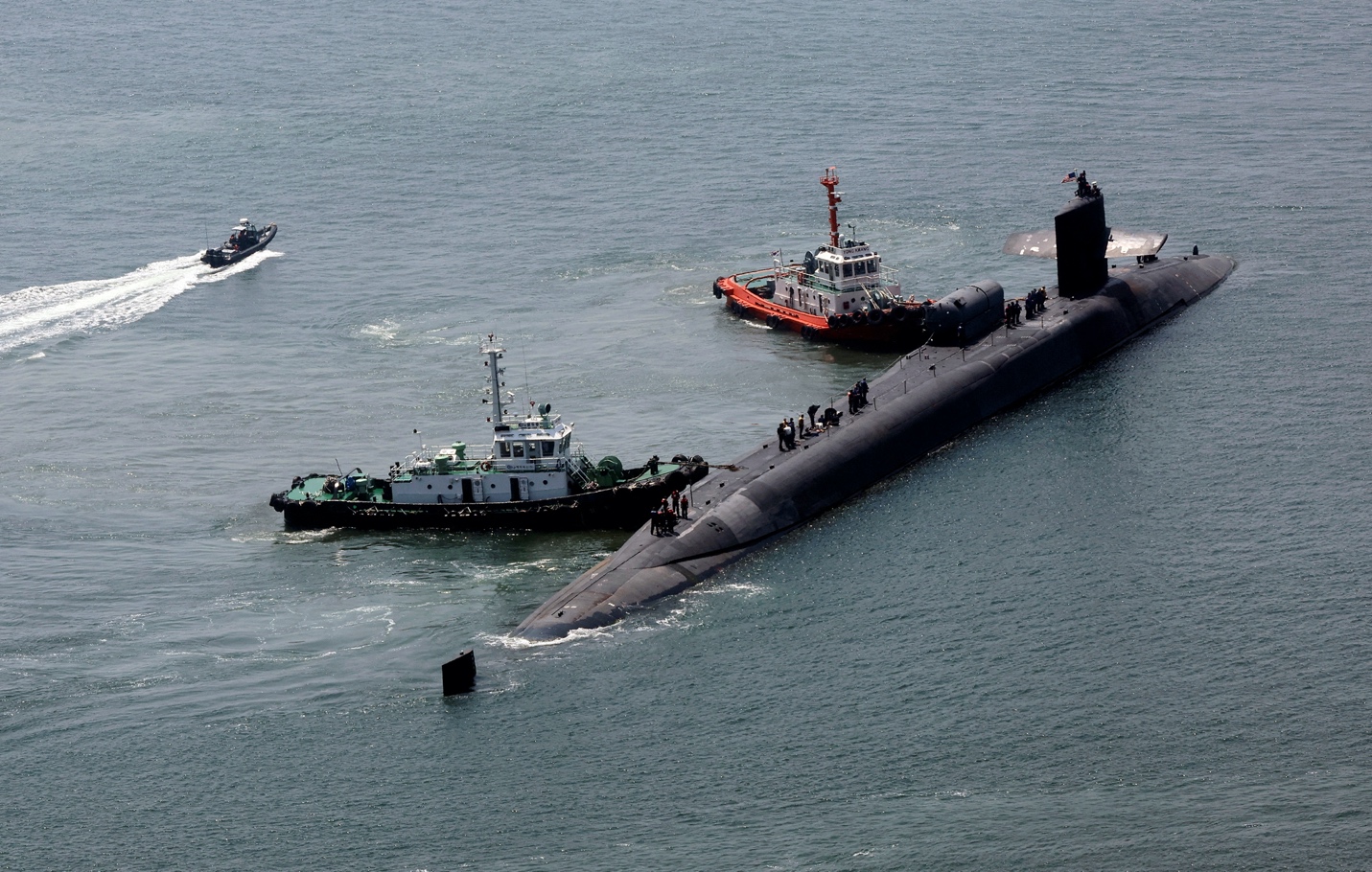
Two months earlier, President Biden met with South Korea’s conservative President Yoon Suk-yeol to discuss ways of furthering U.S.-South Korean military cooperation.
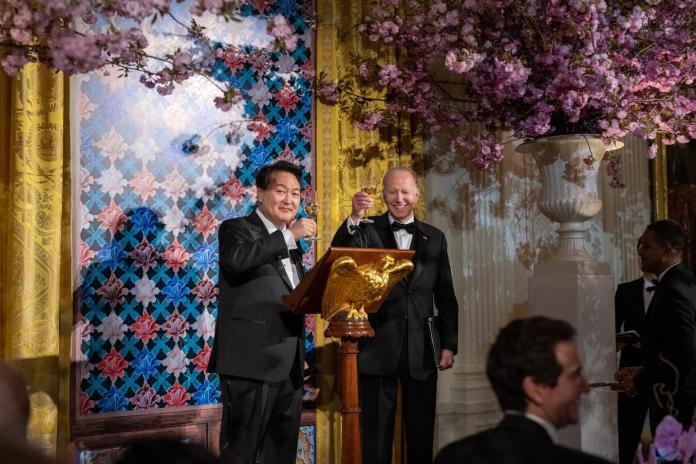
The U.S. currently has 15 military bases and an estimated 28,500 troops stationed in South Korea, who operate about 90 combat planes, 40 attack helicopters, 50 tanks and some 60 Patriot missile launchers.
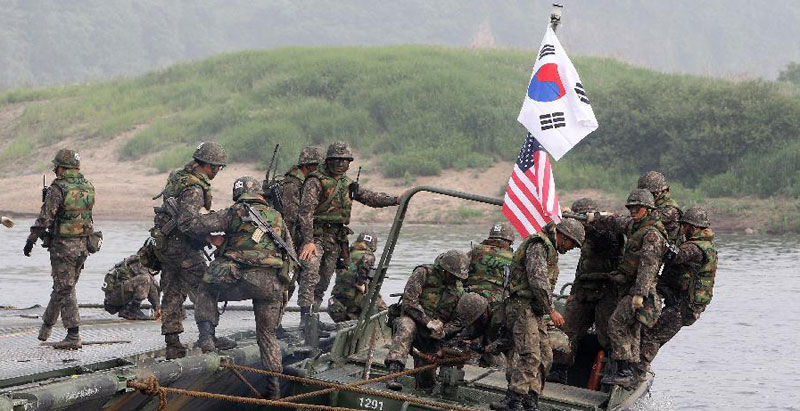
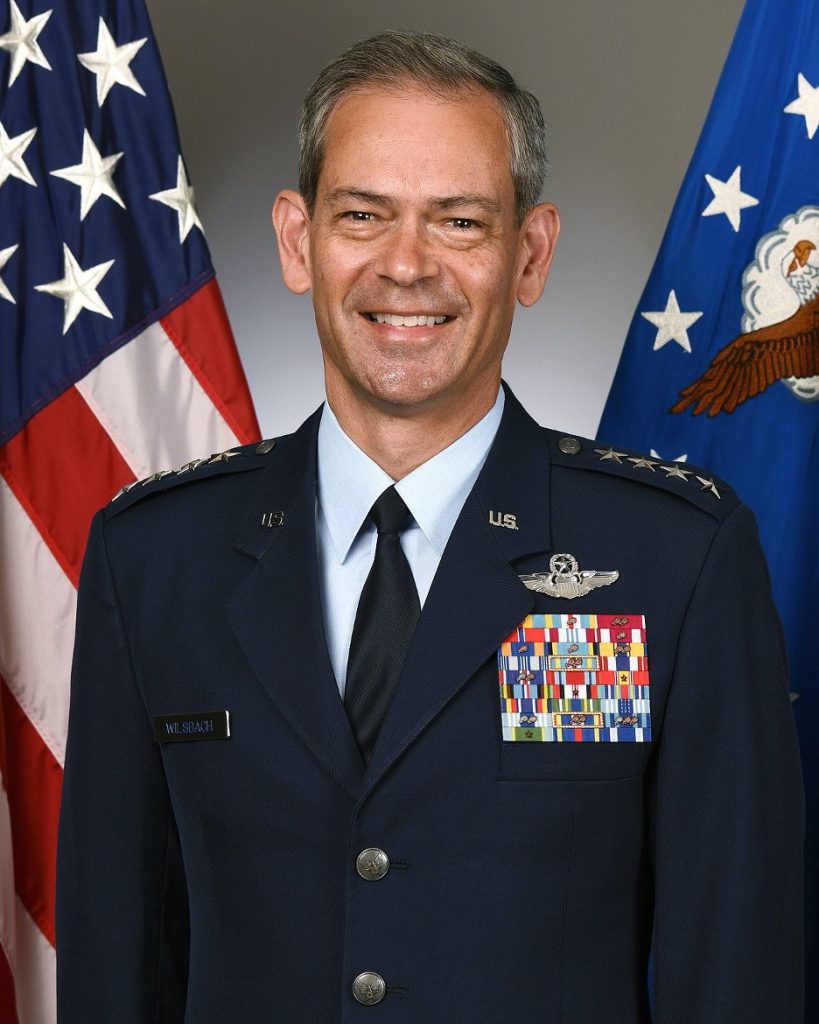
On top of all this, General Kenneth Wilsbach, the Commander of the U.S. Pacific Air Forces, suggested that the U.S. might soon be landing nuclear-capable B-52 bombers at South Korean air bases.
North Korean leader Kim Jong-un’s sister, Kim Yo-jong, stated after Yoon’s visit to Washington in April that “the more the enemies are dead set on staging nuclear war exercises, and the more nuclear assets they deploy in the vicinity of the Korean peninsula, the stronger the exercise of our right to self-defense will become in direct proportion to them.”
What Yo-jong considers North Korea’s right to self-defense is presented by U.S. politicians and in the mainstream media as the “North Korean threat” or “aggression.”
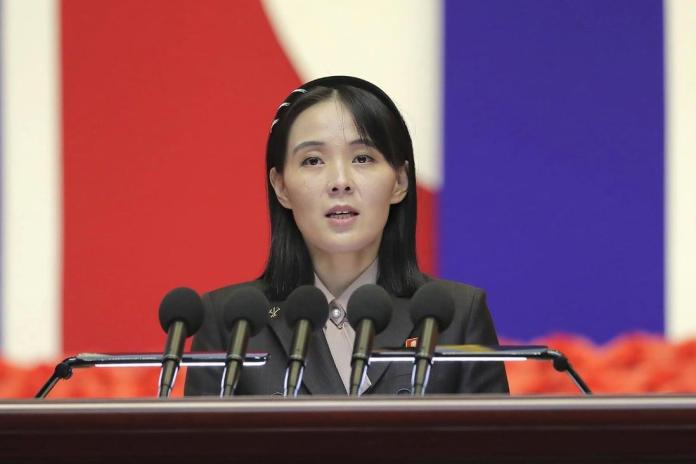
Barbara Lee warned in her speech that current U.S. policies threaten the renewed outbreak of war, which would be disastrous.
Lee said that her father served in the Korean War between 1950 and 1953, which claimed the lives of four million people, mostly Korean civilians along with 33,000 American soldiers. U.S. fighter planes destroyed 80% of North Korean cities, forcing millions of Korean civilians to flee their homes and separating at least 10 million families.
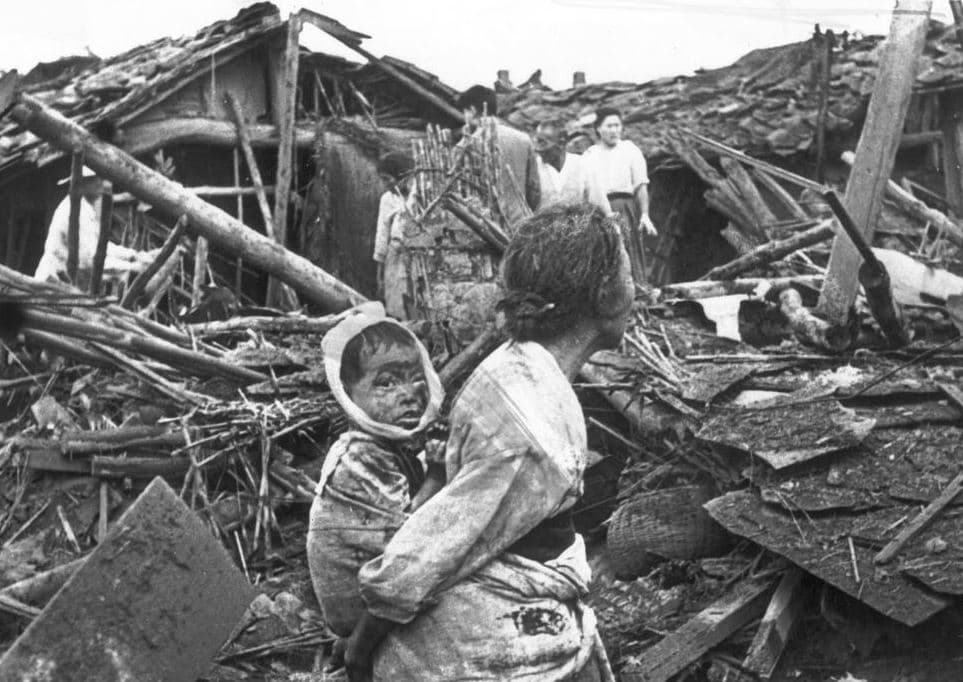
This deadly human toll has largely been forgotten in the U.S, which has experienced a “form of collective amnesia.”
Lee was followed on the podium by Congresswoman Judy Chu (D-CA), a supporter of the Peace on the Korea Peninsula Act who said that she was moved on a recent visit to South Korea by an 86-year-old woman, Sun Bac Kim, whose dying wish is to be reunited with her family after having been separated during the Korean War.
Under current legislation, U.S. citizens are banned from visiting North Korea, which is under coercive economic sanctions, and only a small number of South Koreans are able to visit with family members in the North under a lottery system.
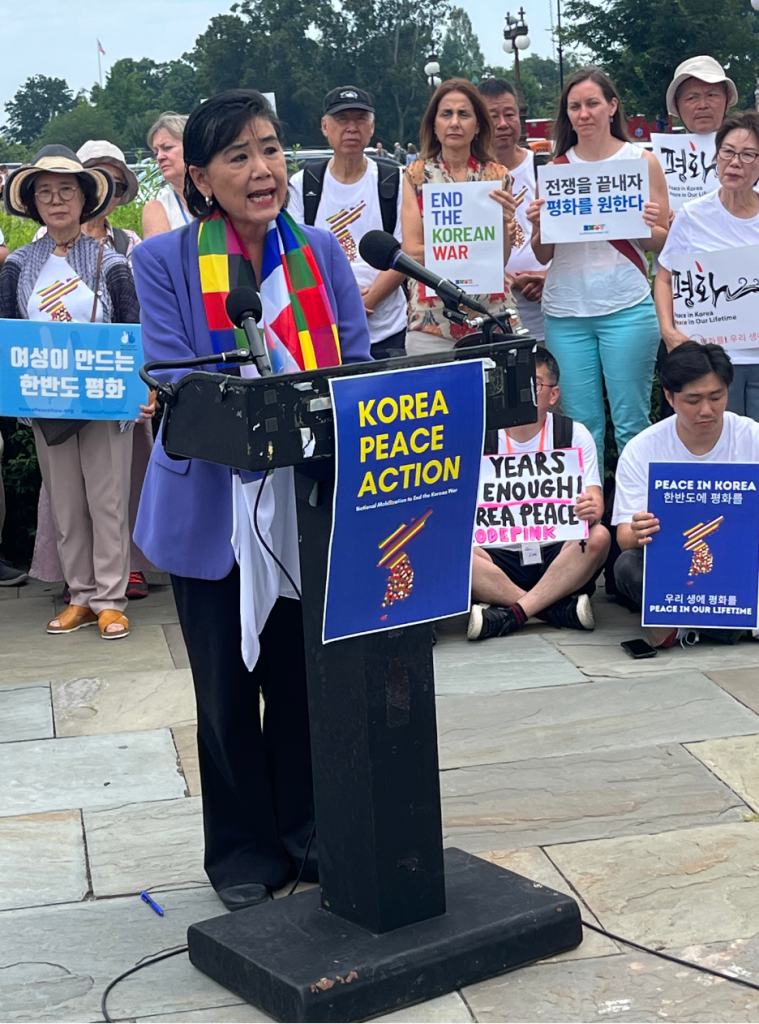
Joy Lee Gebhard, a woman in her late 80s, spoke at the rally about the traumatic experience of being separated during the Korean War from her family who lived in North Korea.
Sixteen at the time, Ms. Gebhard traveled to Seoul and then came to live in the United States in 1956. She only learned in 1980 that members of her family living in North Korea were still alive and has been barred from seeing them and even from sending a letter to her siblings.
Gebhard fears that she is running out of time to see her family members again and urges people to support the Peace on the Korean Peninsula Act, which would end the travel ban.
At the end of her speech, Gebhard read a poignant poem about her mother in which she recounted crying at night because of the separation, and dreaming about seeing her again, which was now impossible since her mother died at the age of 46.
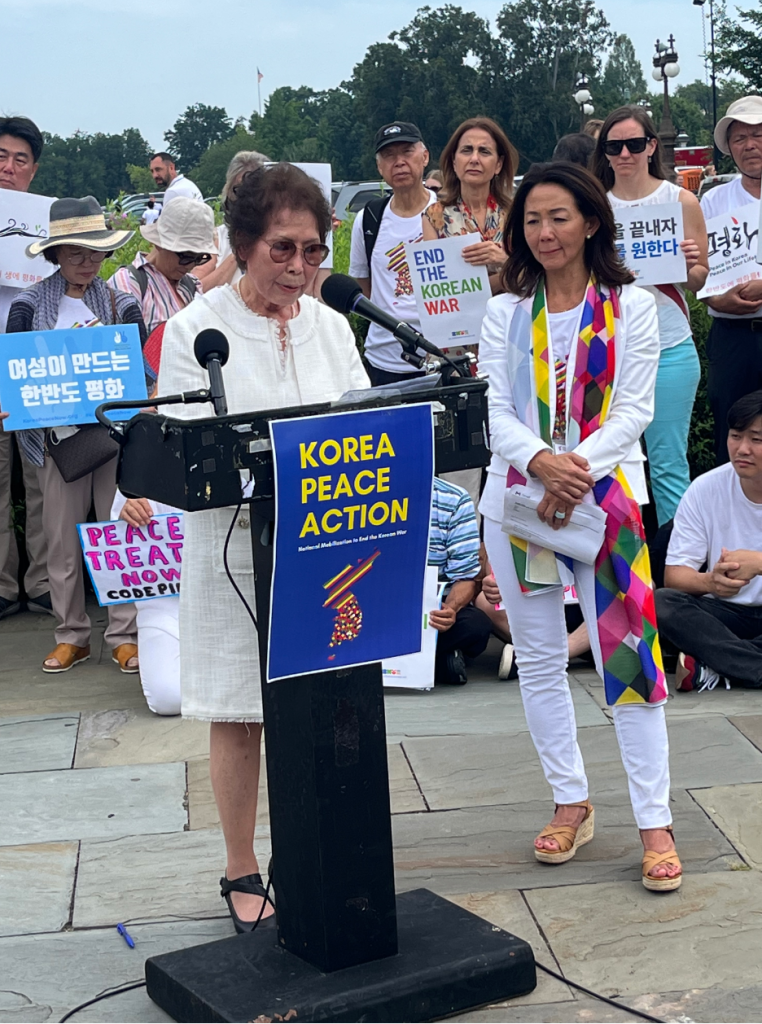
Rick Downes, who chairs the Coalition of Families of Korean War & Cold War POW/MIAs, was a child when his father Hal Downes, an Air Force pilot and All-American ice hockey goaltender at the University of Michigan, was shot down during the Korean War.
Downes said at the July 27 press conference that he and others like him cannot find out precisely what happened to their loved ones who died in Korea or recover their remains, and cannot get closure until the war is formally ended.
On a 2016 visit to Pyongyang, Downes flew over the area where he believed his father died, and said that people in the U.S. and North Korea should get to know each other, which would be a way to heal the wounds of a war that went on for too long.
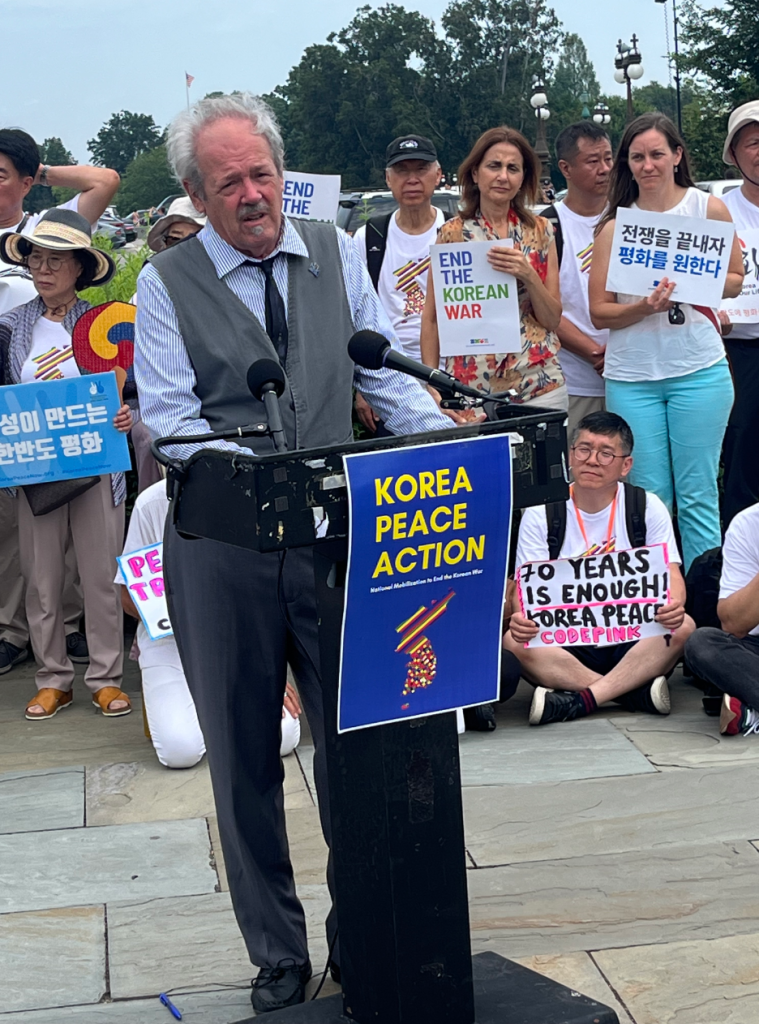
Dan Leaf, a retired three-star Lieutenant General and Deputy Commander of the U.S. Pacific Command, followed Downes by proposing that the Biden administration appoint a senior director at the National Security Council for resolving the Korean War. The job would be to prepare for the peace in Korea that everybody wants. At this time unfortunately, Leaf said, there is nobody in the government whose job it is to make peace—neither in Korea nor elsewhere.
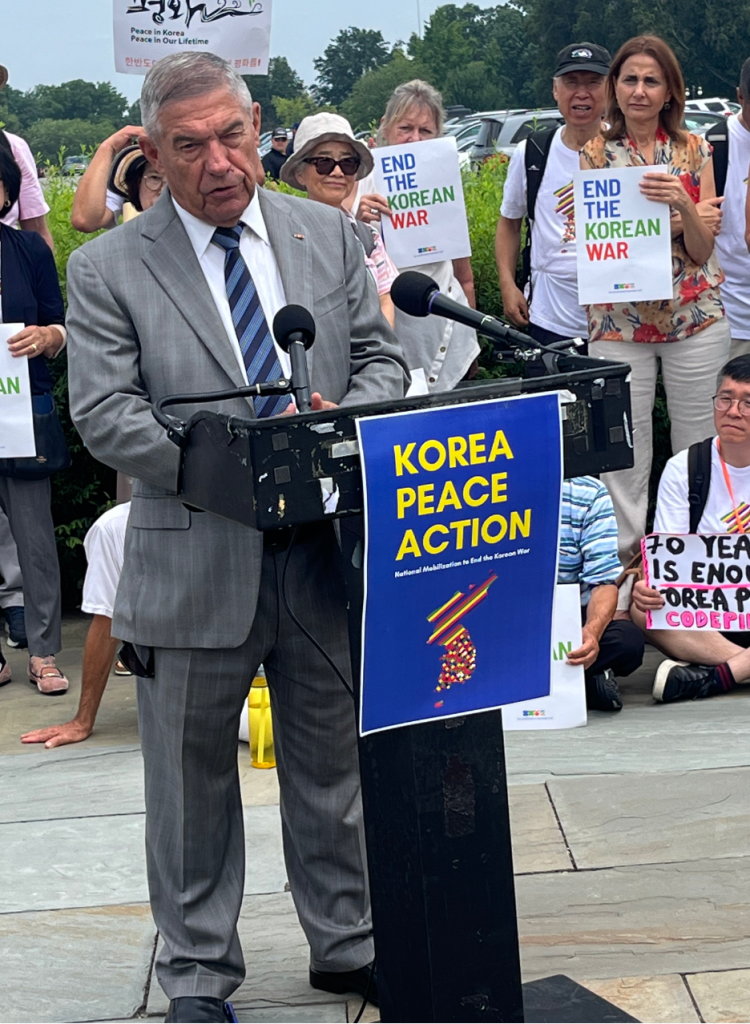
The final speaker at the press conference, Hana Kim, is a 14-year-old child actress from Los Angeles who said that she was speaking for Generation Z.
Ms. Kim said that her great-grandfather had traveled to North Korea on the eve of the Korean War in 1948 on a humanitarian mission to help develop the country and became separated from his family as a result of the war.
Kim’s grandmother also became a refugee who always remembered crossing a bridge on the Han River during the war as a four-year-old to escape the violence in her hometown as she heard the explosions behind her.
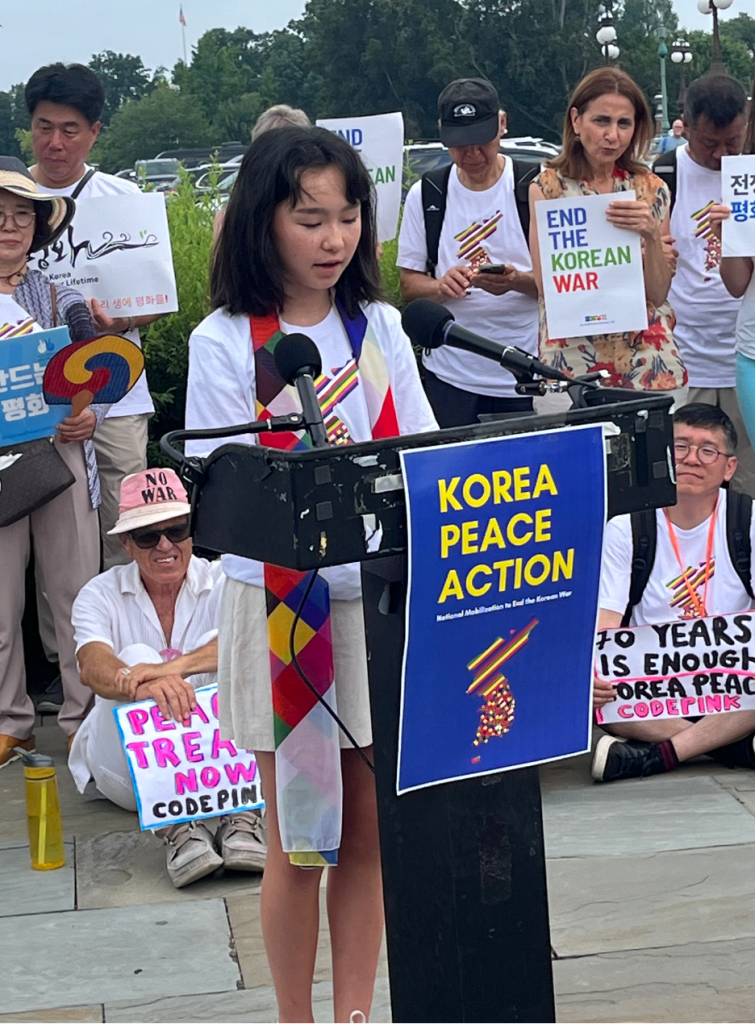
Ms. Kim said that her generation sees war as destructive and wasteful and is facing economic uncertainty and potential environmental disaster.
She ended by saying with a passion that the imperative for peace is great, and this is indeed what we should all be working for.
Rally for Peace
After the press conference, there was a peace rally in front of the White House and march to the Lincoln memorial where more speeches were given and people joined together in Buddhist prayer and sang Korean peace and protest songs.

The temperature outside was close to 100 degrees Fahrenheit, but people were cooled off by a brief downpour.
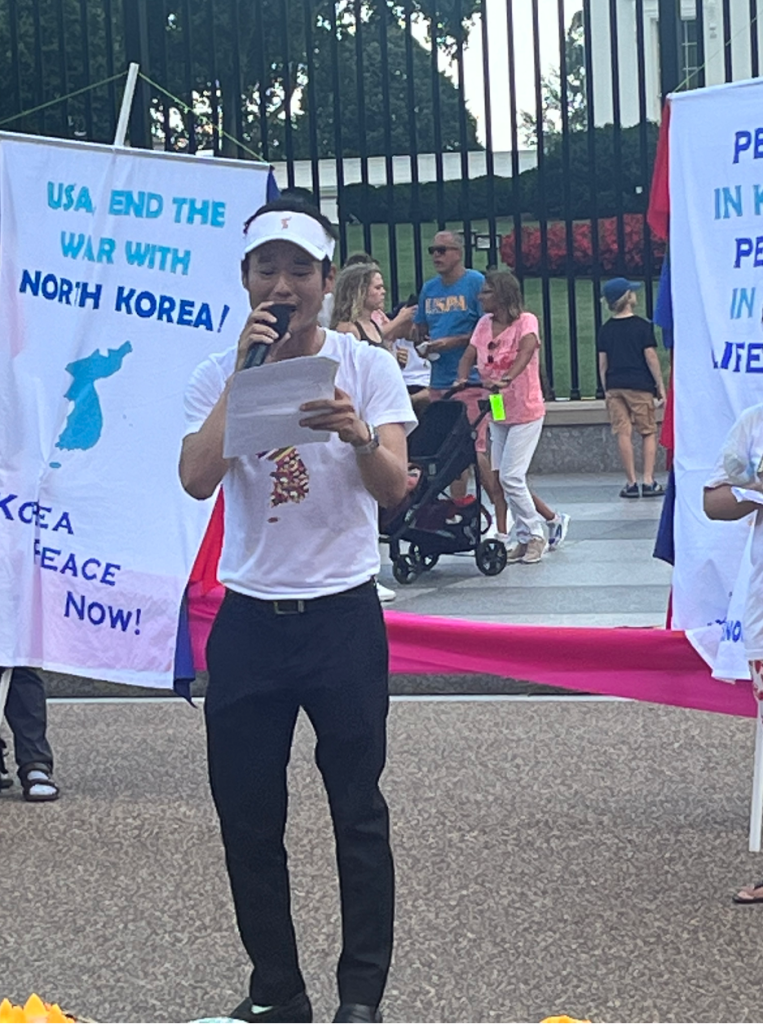
The people’s spirit was exuberant as they called for ending the Korean War and dismantling of U.S. military bases in South Korea, the Philippines and Okinawa.

Some of the marchers displayed photos of loved ones who were killed during the Korean War.
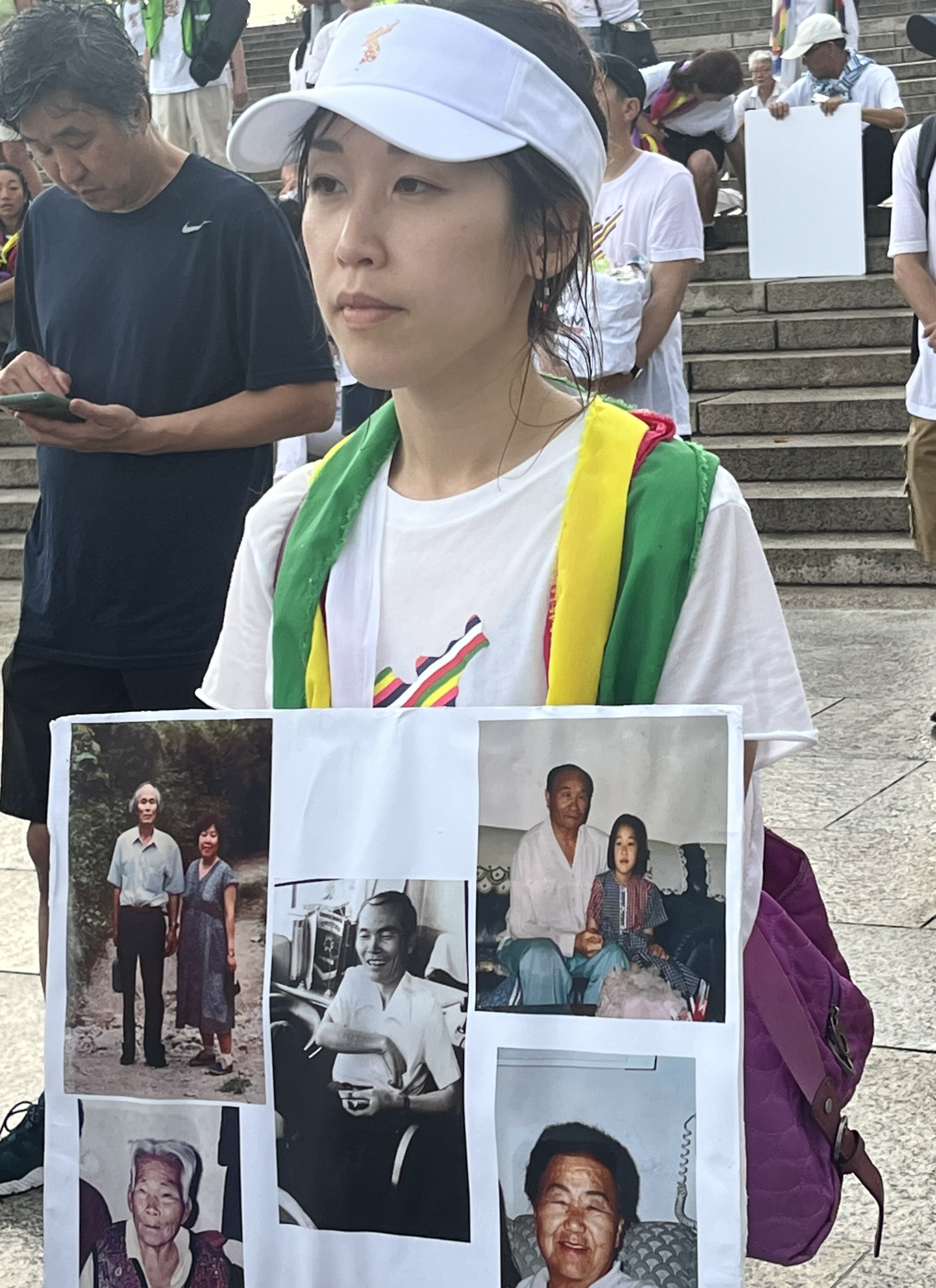
One speaker detailed the sins of the U.S. in Korea, ranging from the bombing and massacre of civilians like at No Gun Ri, environmental degradation, the denial of Korea’s right to self-determination and carving up of the country like it was a spoil of war after World War II, along with support for sex trafficking and murderous dictators in South Korea.
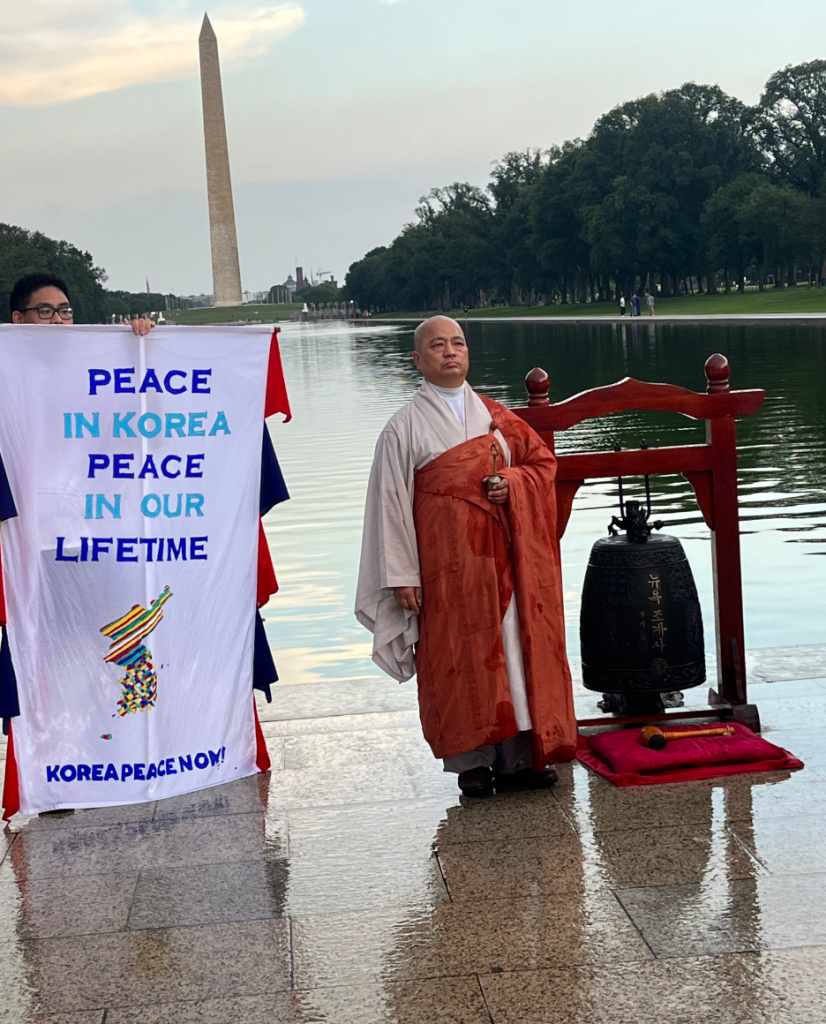
The U.S. also in 1958 introduced nuclear weapons into South Korea in violation of the 1953 armistice, demonized and persecuted Koreans who wanted reconciliation with the North, supported red-baiters in the South who stoked fear of North Korea, expanded the U.S. military base network, and carried out provocative military drills.
The main foreign policy goal has been to undermine and isolate the Democratic People’s Republic of Korea (DPRK-North Korea regime), which American leaders made promises to that were repeatedly betrayed.
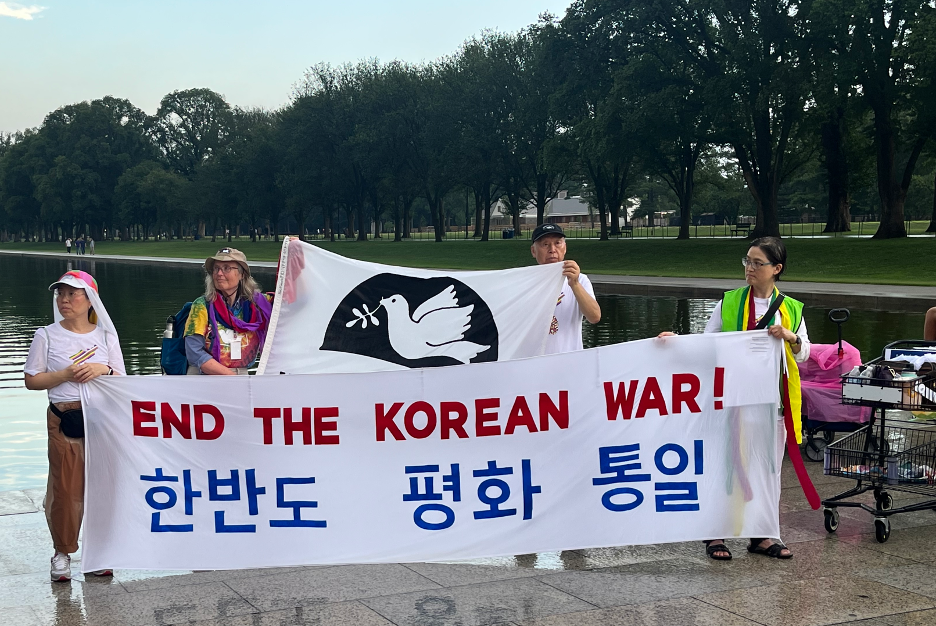
Disgracefully, many Americans have grown rich off the suffering of the Korean people, including from weapon sales and investment in military industries via stock purchases and retirement portfolios.
One speaker emphasized that the American public’s indifference towards the fate of the Korean people is exemplified by the Korean War memorial next to the Lincoln memorial, which highlights the hardship experienced only by American soldiers in the war and not the vastly greater hardships experienced by Koreans.
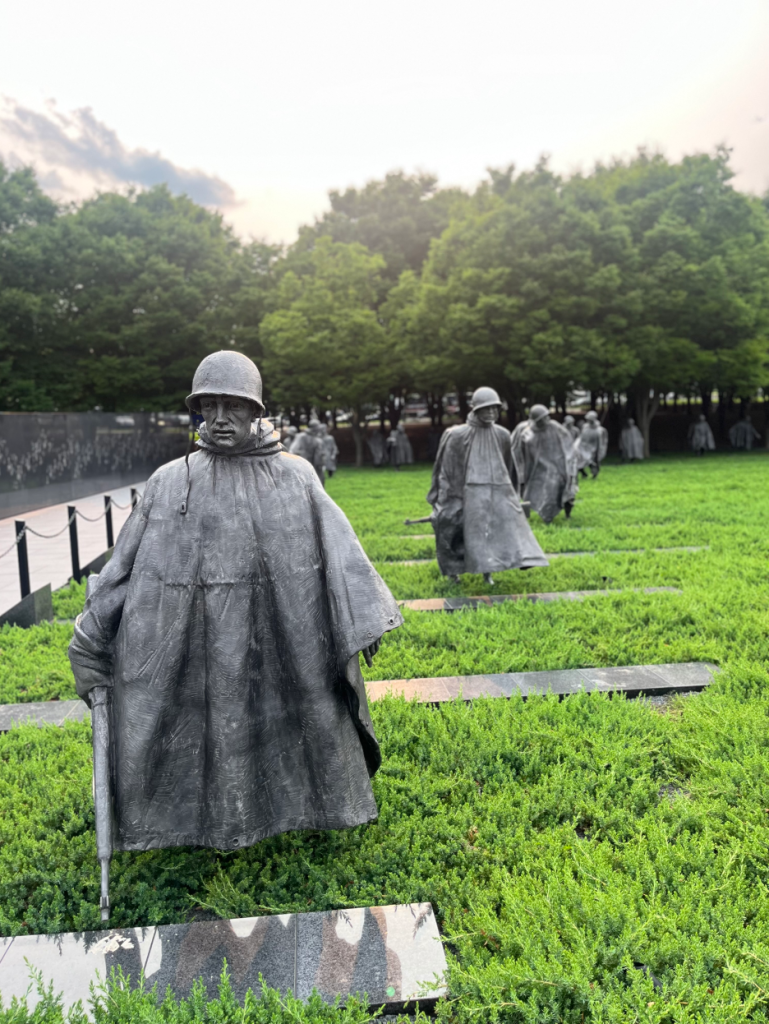
A plaque honoring U.S. troops admits that South Korea was a country that they “never knew.”

Another speaker at the rally said that one day he hopes that Americans could receive absolution for their sins in Korea if they acknowledged the gravity of what they had done.
The end of the rally was truly uplifting as people weaved bands of cloth designed to commemorate victims of war together and sang and danced to violin music after a Buddhist monk chanted peace hymns.

One hopes that this spirit will linger and that participants in the rally will provide the spark for a larger peace movement in the U.S. that could help end the Korean War and Ukraine proxy war, and that could help halt the U.S. push for war with both China and Russia as a new multi-polar world order takes hold.

CovertAction Magazine is made possible by subscriptions, orders and donations from readers like you.
Blow the Whistle on U.S. Imperialism
Click the whistle and donate
When you donate to CovertAction Magazine, you are supporting investigative journalism. Your contributions go directly to supporting the development, production, editing, and dissemination of the Magazine.
CovertAction Magazine does not receive corporate or government sponsorship. Yet, we hold a steadfast commitment to providing compensation for writers, editorial and technical support. Your support helps facilitate this compensation as well as increase the caliber of this work.
Please make a donation by clicking on the donate logo above and enter the amount and your credit or debit card information.
CovertAction Institute, Inc. (CAI) is a 501(c)(3) non-profit organization and your gift is tax-deductible for federal income purposes. CAI’s tax-exempt ID number is 87-2461683.
We sincerely thank you for your support.
Disclaimer: The contents of this article are the sole responsibility of the author(s). CovertAction Institute, Inc. (CAI), including its Board of Directors (BD), Editorial Board (EB), Advisory Board (AB), staff, volunteers and its projects (including CovertAction Magazine) are not responsible for any inaccurate or incorrect statement in this article. This article also does not necessarily represent the views the BD, the EB, the AB, staff, volunteers, or any members of its projects.
Differing viewpoints: CAM publishes articles with differing viewpoints in an effort to nurture vibrant debate and thoughtful critical analysis. Feel free to comment on the articles in the comment section and/or send your letters to the Editors, which we will publish in the Letters column.
Copyrighted Material: This web site may contain copyrighted material the use of which has not always been specifically authorized by the copyright owner. As a not-for-profit charitable organization incorporated in the State of New York, we are making such material available in an effort to advance the understanding of humanity’s problems and hopefully to help find solutions for those problems. We believe this constitutes a ‘fair use’ of any such copyrighted material as provided for in section 107 of the US Copyright Law. You can read more about ‘fair use’ and US Copyright Law at the Legal Information Institute of Cornell Law School.
Republishing: CovertAction Magazine (CAM) grants permission to cross-post CAM articles on not-for-profit community internet sites as long as the source is acknowledged together with a hyperlink to the original CovertAction Magazine article. Also, kindly let us know at info@CovertActionMagazine.com. For publication of CAM articles in print or other forms including commercial internet sites, contact: info@CovertActionMagazine.com.
By using this site, you agree to these terms above.
About the Author

Jeremy Kuzmarov holds a Ph.D. in American history from Brandeis University and has taught at numerous colleges across the United States. He is regularly sought out as an expert on U.S. history and politics for radio and TV programs and co-hosts a radio show on New York Public Radio and on Progressive Radio News Network called “Uncontrolled Opposition.”
He is Managing Editor of CovertAction Magazine and is the author of six books on U.S. foreign policy, including Obama’s Unending Wars (Clarity Press, 2019), The Russians Are Coming, Again, with John Marciano (Monthly Review Press, 2018), Warmonger. How Clinton’s Malign Foreign Policy Launched the U.S. Trajectory From Bush II to Biden (Clarity Press, 2023); and with Dan Kovalik, Syria: Anatomy of Regime Change (Baraka Books, 2025).
Besides these books, Kuzmarov has published hundreds of articles and contributed to numerous edited volumes, including one in the prestigious Oxford History of Counterinsurgency .
He can be reached at jkuzmarov2@gmail.com and found on substack here.

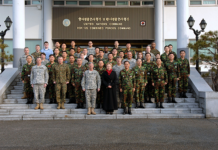
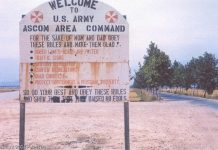
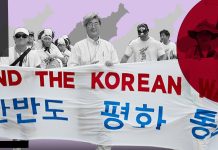
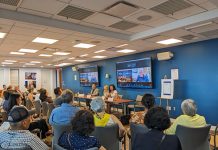

https://www.youtube.com/watch?v=mvsGbZt35XA
Perhaps this is just a glitch in my own personal computer. In the most recent articles the reply section is no longer available. So readers can no longer make comments on the articles.